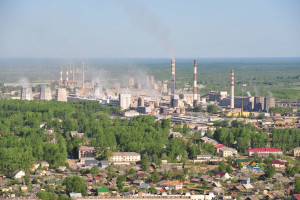
With its planned economy and arms race, the Soviet Union bequeathed to Russia more than 300 big and small towns – so called “monotowns” where one enterprise (be it a factory, a plant or a mine) employs the majority of the town’s working population. More than 15 million people, or one in ten Russians, live in such towns.
The situation of most monotowns is extremely unenviable due to the absence of demand on products manufactured by them on the open market. Russia’s current economic crisis has only worsened an already dire situation. Wages are being held back and unemployment is rising which leads to an increase in social tensions. According to official estimates, only 22 percent of monotowns, or 71 such communities, enjoy a stable social and economic situation. However, in 94 monotowns, enterprises either have been closed down or are currently facing a deep crisis which results in employees not being paid while municipal budgets have no money even to cover the bare essentials.
In the 25 years since the collapse of the Soviet Union, the Russian government has tried different ways to solve the problem of monotowns. In the 1990s, restricted administrative and territorial entities (RATE), most of which were monotowns, were authorized to grant tax benefits which ended in them being widely used by the country’s major private businesses to evade taxes. The economy of monotowns did not in any way benefited from this, and in the early 2000s, RATE were deprived of the tax privilege.
During the 2008-2009 economic crisis, monotowns were living on money inflow from the federal budget, which at the time was large enough due to high oil prices. By 2014, the Russian government established the Monotown Development Fund, to coordinate both government and private investments in this socially important sphere. As of the end of 2015, around 7.5 billion rubles were allocated to monotowns from this fund. It was assumed that this money would be spent mostly on construction and renovation of the urban infrastructure. Considering today’s investment climate in the country, an active economic growth is not to be expected. The Fund director himself declares that his goal consists in “creating 40,000 jobs unrelated to monoenterprises”. Thus, the Fund plans to provide jobs for only 0.27 percent of monotown residents. It would probably be more efficient to spend this money to relocate people from poverty-stricken towns to the country’s more promising regions.
A few years ago, the Russian Ministry of Labor had already tried to tackle the problem of monotowns through relocation but this project turned to be unsuccessful since the funds allocated from the federal budget were insufficient to cover the relocation to regions with a low unemployment rate, and nobody wanted to move to yet another poverty-stricken region.
Today, the majority of enterprises in single-factory towns are privately owned and incorporated into the structure of major industrial holdings such as SUEK, SEVERSTAL and RUSAL. This is both a help and a hindrance. On the one hand, in some ways, corporations support the infrastructure of monotowns. On the other hand, however, the objective of commercial organizations consists in deriving profit – not promoting the welfare of the local population. The example of Pikalevo where local workers, who had not been paid for several months, blocked a federal highway, and Putin had to personally intervene to solve the conflict, proves this point.

The population of Pikalevo does not exceed 20,000 people. But how should one deal with Togliatti, a single-factory city with a population of more than 700,000 people that has grown around AvtoVAZ? In February 2016, AvtoVAZ switched to a four-day working week as a result of a cutback in production. Local authorities celebrate the fact that Togliatti is now officially considered as a city sliding into depression, and rely exclusively on federal support. Based on Pikalevo’s experience, considering the existing federal budget deficit and cuts in public spending that have affected all sectors except for defense, it is safe to assume that the Kremlin will not intervene unless serious public unrest breaks out in Togliatti. Only unlike owners of Pikalevo factories, Sergei Chemezov, Putin’s close friend from the KGB and CEO of state-owned corporation Rostec that controls AvtoVAZ, might prove to be unwilling to negotiate and will simply bring in troops to deal with public discontent.





